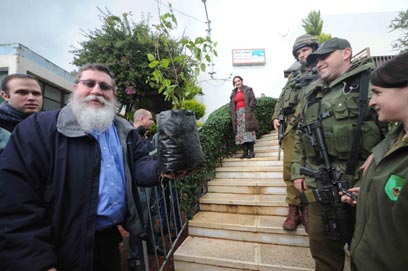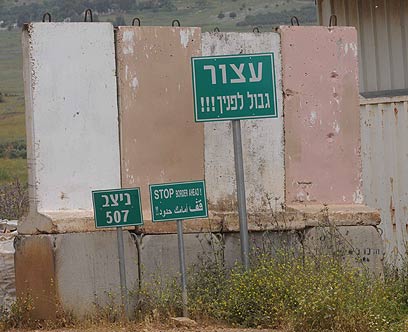
Ghajar remembers IDF withdrawal from Lebanon
On that day, village became like 'army base'. UN suggested dividing village between Israel, Lebanon but villages insist: Ghajar will remain united
Ten years on, the residents of Ghajar on the Israel-Lebanon border remember the IDF withdrawal from the land of the cedars. "That was the day we changed from a normal village with views over Kiryat Shmoneh and the Golan Heights to being a closed army camp," the residents say.
Some 2,300 live in the village today, all once Syrians whose homes were annexed to Israel when the Golan Heights were taken in 1967. When the IDF withdrew from Lebanon in May 2000, they discovered their village was divided by the newly recognized border. About two thirds live north of the border, and one third south. Since the second Lebanon war, Israel occupies both parts, fearing that the village could be used as a passage for terror.
The council building, supermarket, and school are in the south of Ghajar, where the highway leading to the northern Galilee towns can also be accessed. Soldiers and sometimes policemen are posted at the entrance. Every vehicle entering or exiting is meticulously checked, and guests require a special permit to enter. Barbed wire fences surround the village.
"In terms of our obligations, we are Israeli, but in terms of rights we don't exist" the village secretary-general Najib Hatib says. "In school they teach the Ministry of Education syllabus, we pay taxes, we vote in the Knesset elections, but when there's a problem with the water supply, or electricity, or telephone – nothing happens, because no technician is willing to go through the IDF checkpoints to repair anything. Tourists who once came to look over Lebanon are no longer authorized to enter."

'Soldiers patrol under the window'
During the second Lebanon war, Katyushas fell on village land as well. After the war, UN Resolution 1701 determined the division of the village, but four years later the situation remains unresolved. Ghajar has seen a series of visits from ministers including Foreign Minister Avigdor Lieberman and National Union MKs who supported the unity of the village.
"I live in the northern part, and my children in the south," said Yosef (64), a village resident. "I have a lot of agricultural land. How can they come and say, leave them to Lebanon and live in the south or else you'll see the border separating you from your children? Why can't we have our say? We want to live our lives and not be corralled between wire fences. We live here like in an army base. Armed soldiers patrol underneath our windows. How can we bring up our children like this? Nothing will heal their trauma. Our fear is that one day we'll wake up and find ourselves divided between Israel and Lebanon."
Recently, village representatives participated in a meeting of the Security and Foreign Affairs Committee and presented the problems they face. They say they have no contact with Lebanon except for repeated calls from Lebanese media who are interested in the possible division of the village which Hezbollah is certain is entirely Lebanese.

'Another wall in Israel'
"Like in most places we have a problem of unemployment," Hatib explained. "But in hospitals in the north you'll find Ghajar people among the staff and doctors. We have lawyers, merchants and many young people who study in colleges and universities throughout the country. We're tired of living in uncertainty. We don't want to be refugees in Lebanon."
Ghajar residents assert that the village's fate is linked to the fate of the Golan Heights. "We have families and friends there," Yosef says. "We have documents showing that the land belongs to Syria.
In the past, the residents say, there was talk of land exchange, but they reject this proposal, saying that the land was passed down from generation to generation. "We refuse 'evacuation and compensation.' We're not settlers, we're the owners, and we won't give up our property."
They have recently turned to the UN again to ask to be party to discussions about the fate of the village. In any case, the village must not be divided – about this they are adamant.










